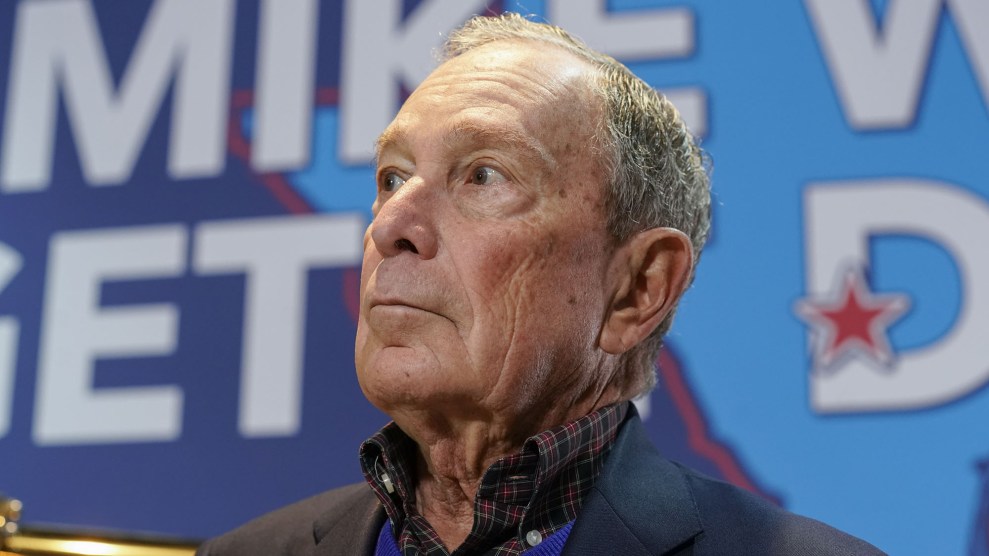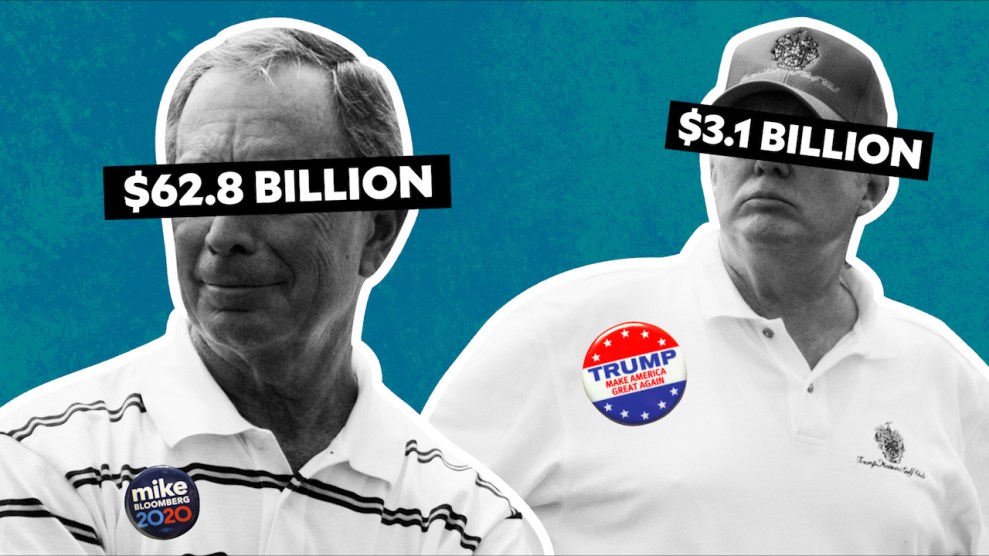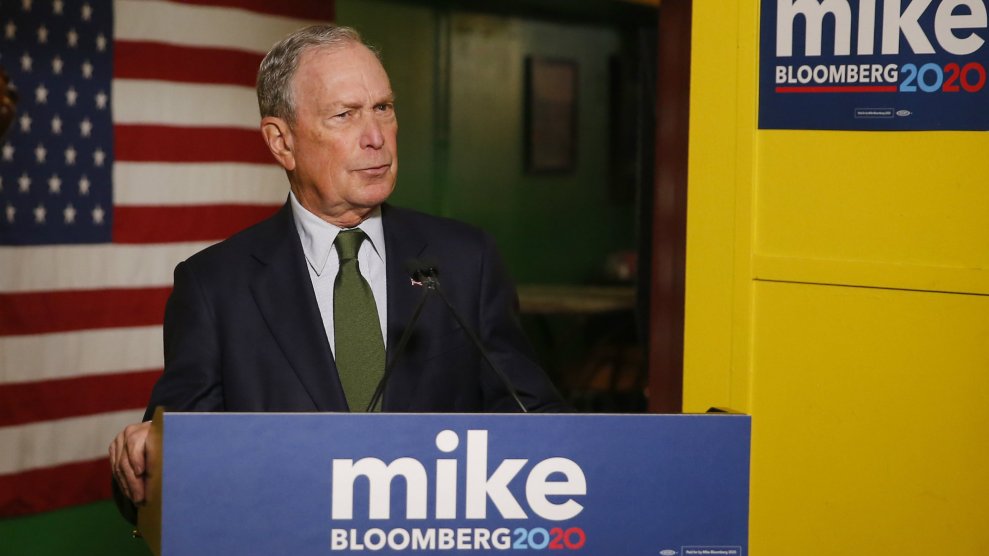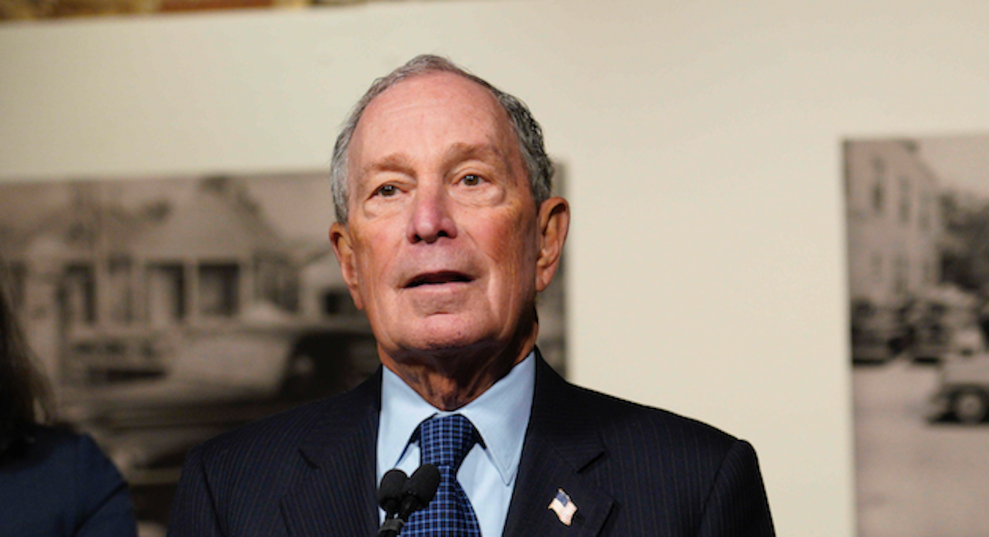
Bob Daemmrich/ZUMA Wire
To call Michael Bloomberg’s campaign for the Democratic presidential nomination unorthodox would be an understatement. The former New York mayor is skipping the early voting states of Iowa, New Hampshire, Nevada, and South Carolina. He’s not accepting individual donations—instead spending $200 million of his own money in just the first two months of his campaign—and consequently he’s also skipping the debates, whose criteria for inclusion require a certain number of donors.
And then there’s the matter of his record. Over two decades in politics, Bloomberg, a self-described fiscal conservative and social liberal, has switched his party affiliation three times and defied the Democratic party’s base on key issues. His history of degrading comments about women, meanwhile, has dogged him throughout his political career.
As the mogul prepares to reissue his 1997 memoir, Bloomberg by Bloomberg, here’s the candidate in his own words:
On political parties (1998):
“I have always been a registered Democrat.” (source)
On political parties (2001):
“Well, the Republican Party called me, asked me to run. I’ve been endorsed by almost all local Republican government officials and party leaders. And I agree with the Republican values of those inclusive Republicans like the mayor, like the governor. And I’m very comfortable in running as a Republican, and I will stay a Republican long after this election.” (source)
On political parties (2007):
“I have filed papers with the New York City Board of Elections to change my status as a voter and register as unaffiliated with any political party. Although my plans for the future haven’t changed, I believe this brings my affiliation into alignment with how I have led and will continue to lead our city.” (source)
On political parties (2018):
“Today, I have re-registered as a Democrat—I had been a member for most of my life—because we need Democrats to provide the checks and balance our nation so badly needs.” (source)
On his ideology:
“I actually am a conservative—more so than other conservatives in the sense that I think you could go and cut 2 or 3 percent out of the budget in every agency. We’ve done that 12 times, and we’ve cut roughly a billion and a half, and there’s six-odd billion that’s recurring, and you can go and cut people or find other revenue sources.” (source)
On the Iraq War (2004):
“Don’t forget that the war started not very many blocks from here.” (source)
On the Iraq War (2020):
“I don’t live in a regret world, and I didn’t make the decision.” (source)
On George W. Bush (2004):
“We are going to get George W. Bush re-elected as president of the United States! We are going to carry New York City and New York State. Everybody thinks I’m crazy, but I think we can do it.” (source)
On whether Bush was the right choice over John Kerry (2020):
“Kerry is a friend. Bush is a casual friend. I guess Bush came to the city’s aid when I asked him to. He gave us a lot of money, which we wanted. We know what Bush did. We don’t know what Kerry would have done. So I don’t see how you can make a comparison.” (source)
On Barack Obama, whom he endorsed in 2012:
“I am sympathetic that he has a Congress that is partisan. In the past two hundred and thirty-five years, we’ve probably had lots of partisan Congresses. His job is to try to bring the parties together. And when he works at it he has actually done some pretty good things.” (source)
“This business of ‘Well, they can afford it; they should pay their fair share’? Who are you to say somebody else’s fair share?” (source)
On women, according to The Portable Bloomberg: The Wit and Wisdom of Michael Bloomberg, a booklet assembled by his employees in 1990:
“If women wanted to be appreciated for their brains, they’d go to the library instead of to Bloomingdale’s.” (source)
On his company’s signature product, the Bloomberg Terminal, according to The Portable Bloomberg:
“It will do everything, including give you [oral sex]. I guess that puts a lot of you girls out of business.” (source)
On the British royal family, according to the same book:
“What a bunch of misfits—a gay, an architect, that horsey faced lesbian, and a kid who gave up Koo Stark for some fat broad.” (source)
On his comments in The Portable Bloomberg (2001):
“I don’t remember ever saying that…And the fact that it comes up three days before a primary—come on, that’s just normal politics, so I’m told. I’m not a politician and I don’t want to get involved in it…It doesn’t reflect me. I apologize if anybody’s offended by it. But I didn’t say those things.” (source)
On whether he’d ever “made a comment to the effect that you would like to ‘do that piece of meat,’ or I’d ‘do her in a second.’”
“I don’t recall ever using the term ‘meat’ at all.” (source)
On Jennifer Lopez:
‘I tell you what—who I’d really want to have: J.Lo.” (source)
On raising the minimum wage (2012):
“They would make it harder and more costly for businesses to stay, and harder and more costly for businesses to thrive.” (source)
On raising the minimum wage (2015):
“I, for example, am not in favor, have never been in favor, of raising the minimum wage.” (source)
On raising the minimum wage (2019):
“To fight poverty, we need to do something even more basic, and that is raise incomes. And we should start with the most straightforward change: raising the minimum wage.” (source)
On learning that a co-worker was pregnant, according to a 1997 sexual harassment lawsuit:
“Kill it!” (source)
On what he wants in life, according to the same lawsuit:
“I would like nothing more in life than to have Sharon Stone sit on my face.” (source)
On what it would take for him to believe a rape allegation:
“I guess an unimpeachable third-party witness” (source)
On Wall Street:
“They have done some bad things. I suppose everybody has, every industry has. But the mortgage crisis was not the exclusive creation of the banks. We all wanted everybody to get a mortgage regardless of whether they could afford it, and that eventually leads to euphoria and exaggeration and to sloppiness and a variety of those things. But Fannie and Freddie were as guilty as everybody. I’m not taking the banks off the hook. But I don’t think that just because you’re a banker you should be vilified.” (source)
On Occupy Wall Street:
“This isn’t an occupation of Wall Street, it’s an occupation of a growing, vibrant residential neighborhood in lower Manhattan.” (source)
On criticisms of Wall Street:
“This is our industry. We’d appreciate it if someone recognized that this is our tax base.” (source)
On fines handed out to banks in the aftermath of the financial crisis:
“Some of these fines I think are outrageous and shouldn’t be allowed to take place.” (source)
On endorsing Scott Brown in his re-election campaign against Elizabeth Warren, ostensibly because Brown voted against a bill to extend concealed-carry reciprocity.
“He’s not good on other things that I would like. He’s not good on guns generally, but this was something that was really critical, saving a lot of lives, and that’s what I think you should give support to, people that do the right thing.” (source)
On the Green New Deal:
“I’m a little bit tired of listening to things that are pie in the sky, that we never are going to pass, are never going to afford. I think it’s just disingenuous to promote those things. You’ve got to do something that’s practical.” (source)
On census figures showing New York City’s income inequality had risen sharply during his tenure:
“That’s not a measure of something we should be ashamed of.” (source)
On his successor Bill de Blasio’s critique of income inequality:
“The way to help those who are less fortunate is, number one, to attract more very fortunate people. They are the ones that pay the bills. The people that would get very badly hurt here if you drive out the very wealthy are the people he professes to try to help. Tearing people apart with this ‘two cities’ thing doesn’t make any sense to me. It’s a destructive strategy for those you want to help the most. He’s a very populist, very left-wing guy, but this city is not two groups, and if to some extent it is, it’s one group paying for services for the other.” (source)
On the law signed by Obama to curb too-big-to-fail banks:
“The result of Dodd-Frank is that we are more vulnerable to a handful of banks going belly-up than we were before. Thank you very much! It didn’t accomplish anything, because it wasn’t a well-thought-out piece of legislation. I’m not opposed to legislation. This was just a terrible bill.” (source)
On what caused the housing crisis:
“We had an explicit public policy, which I happen to think is the right policy, to encourage home ownership. We did this through Fannie and Freddie. And the way they raised money was by taking the mortgages and packaging them, otherwise it would have been just commercial banks making local loans and no expansion of the economy and spending on transportation and all of the infrastructure stuff. So it went through a downturn. Is it any worse than other downturns? In some places yes. They overbuilt in Florida, they overbuilt in Arizona. Were there abuses? Yes. People pushed on the mortgages. You pay a mortgage salesman to sell mortgages, will they sell them to everybody? Yeah, if somebody lies about their income. So you gotta say, ‘a consequence of a very expansive housing market is that there will be a downturn and lead to lots of defaults. But on balance, we’re better off because of it.’ And by the way, the people that own those mortgages are in these package deals. Mortgage derivatives were sold to professional investors. Now people say, ‘Oh but I didn’t understand what I was buying.’ This is ridiculous. They should have done the research.” (source)
“It was not the banks that created the mortgage crisis. It was, plain and simple, Congress who forced everybody to go and give mortgages to people who were on the cusp. Now, I’m not saying I’m sure that was terrible policy, because a lot of those people who got homes still have them and they wouldn’t have gotten them without that.” (source)
On his dating life after divorcing his first wife, Susan:
“I am a single, straight billionaire in Manhattan. It’s like a wet dream.” (source)
On the rise of President Donald Trump and Vermont Sen. Bernie Sanders:
“The average person with the education we’re providing our kids today doesn’t understand that we’ve stopped teaching civics, we’ve stopped teaching history, we no longer teach Western civilization. When they hear democratic socialism, which is what Bernie Sanders was promoting, [and think] ‘Yeah, yeah, democratic, that sounds good. And socialism, yeah, it’s like that social media stuff.’” (source)
On Obama’s 2012 criticisms of Bain Capital:
“There’s nothing wrong with working for a private equity firm…Bain Capital is a firm that’s been around a long time. They’ve had successes bailing out companies going out of business. Their business is to take businesses that are failing and change the management, change the number of employees, hire better employees…and get those companies back out there being productive.” (source)
On school vouchers:
“I used to be against school vouchers. Now I think that I’d probably be a lot more in favor of them. I am a believer that the public is better off when it has a choice. The wealthy already have the choice.” (source)
“From a fairness point of view, you can certainly make the case that, you know, if you send your kids to private schools, the public doesn’t have to pay to educate them, and you should get a credit for it. Politically, it is just not going to happen in this state, is a fair way to phrase it.” (source)
On teachers unions:
“If the U.F.T. wants it, it ain’t good.” (source)
On reports that the city council would attempt to repeal the two-term limits for council members:
“The public voted twice for limiting the number of terms…they voted twice to limit them to two terms. Period. And I think it would be an absolute disgrace to try to go around the public will.” (source)
On his subsequent effort to convince the city council to rewrite the city charter to allow the mayor to serve three terms:
“The law said the city council can change the rule. They voted, nobody put a gun to their head. That’s the law. If you don’t like the law, change the law. Don’t complain about somebody living within the law.” (source)
On famed weight-loss guru Dr. Robert Atkins, who died in 2004 after falling on the sidewalk:
“I don’t believe that bullshit that [he] dropped dead slipping on the sidewalk. Yeah, right!…The guy was fat.” (source)
On criticism of his comments about the death of Dr. Atkins:
“I would never criticize somebody about their waistline. Let me just say, ‘You are what you eat.’” (source)
On criticism of stop and frisk (2013):
“I think we disproportionately stop whites too much and minorities too little.” (source)
“If I had a son who was stopped, I might feel differently about it, but nevertheless. Maybe I was inelegant, but I don’t think anybody thinks I am anything but—I hope not, anyway—supportive of trying to help all people. With my own money as well as time, thank you very much. I’ve spent twelve years of my life doing this.” (source)
On criticism of stop and frisk (2018):
“I think people, the voters, want low crime. They don’t want kids to kill each other.” (source)
On criticism of stop and frisk (January 2019):
“I think it’s also true that most police departments around the world do the same thing, they just don’t report it or use the terminology…we certainly did not pick somebody by race.” (source)
On criticism of stop and frisk (November 2019):
“I got something important really wrong. I didn’t understand the full impact that stops were having on the black and Latino communities. I was totally focused on saving lives, but as we know, good intentions aren’t good enough. Now, hindsight is 20/20. But, as crime continued to come down as we reduced stops, and as it continued to come down during the next administration, to its credit, I now see that we could and should have acted sooner and acted faster to cut the stops. I wish we had. I’m sorry that we didn’t. But, I can’t change history. However, today I want you to know that I realize…I was wrong, and I’m sorry.” (source)
On criticism of stop and frisk (December 2019):
“Well, nobody asked me about it till I started running for president. So, c’mon.” (source)
On sexual abuse allegations against Charlie Rose:
“You know, is it true? You look at people that say it is, but we have a system where you have—presumption of innocence is the basis of it.” (source)
On de Blasio’s use of his African American family in campaign ads:
“Racist.” (source)
On Joe Biden:
“Joe Biden went out and apologized for being male, over 50, white. He apologized for the one piece of legislation which is actually a pretty good anti-crime bill, which if the liberals ever read it, most of the things they like is in that bill. They should have loved that, but they didn’t even bother to read it. You’re anti-crime, you must be anti-populist.” (source)












